Fruit News
Former business’ operations director, David Bateman, steps up to the new role, while Robert Wells becomes CEO
David Bateman has been appointed as managing director at banana giant SH Pratt.
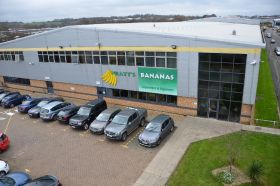
Bateman, who has been with the business for two years, was operations director prior to this appointment. He will lead the day-to-day running of the business, as well as a number of strategic initiatives currently being developed.
Robert Wells, majority shareholder of SH Pratt, will move to the role of CEO, in order to provide further strategic vision
and direction.
In addition, Simon Trewin, commercial director, has been appointed as a full board member of SH Pratt, in order to reinforce the development of the company’s commercial direction.
A spokesperson for SH Pratt said: “As the business grows and develops, we will create additional companies within the SH Pratt Group family; and implement a new brand identity, currently in discussion. This will be implemented in due course.
“Pratt’s Bananas logistics division has seen rapid and successful growth in recent times. To take this part of the business to
the next level, it has been set up as a separate company ‘Kinship Logistics’, under the umbrella of the SH Pratt parent company.
“Kinship, whose name represents the family nature of our business, has been given a brand new fresh and vibrant identity, to help reflect the diverse range of goods we carry. It will also help our vehicles to stand out and be easily recognised. The new identity is currently being rolled-out.”
Tony Hunter, previously head of SH Pratt’s logistics, has been appointed as director of logistics for the new Kinship Logistics company.
Forty workers at Quality Produce International participated in the cancer fundraising Ride for the Roses bicycle race in the Netherlands

Over €45,000 has been raised by employees of Dutch firm Quality Produce International (QPI) for charity.
Forty workers at the company participated in the cancer fundraising event Ride for the Roses bicycle in the Netherlands on 6 September.
This year’s edition was in and around Aalsmeer, and all forty employees completed the 100km race by bicycle without any problems.
Part of the overall total the business raised also came through selling fruit and vegetable boxes, an initiative developed together with local food-service supplier Flexivers.
The rest of the amount was donated by participants, friends and family, but most of all by customers and suppliers.
Marcel Paul, of QPI, said: “The whole team is very proud that we could donate such a fabulous amount at the finish. Hereby we woud like to thank all that helped us for raising this fantastic sum of money for cancer research in Holland, and we hope we can count on all of your support again next year.”
Produce World has produced and launched a new Chinese sweet sprouting cauliflower into select Waitrose stores
New sweet sprouting cauliflower has been launched into limited numbers of Waitrose stores through vegetable supplier Produce World.
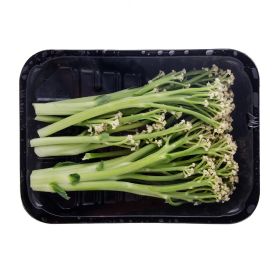
The brassica, which is native to China, can be eaten raw or cooked, and is sweeter than a traditional cauliflower. It has long stems and small, white heads, described as “less intimidating” to younger consumers.
“Sweet Sprouting Cauliflower has been popular in China for a long time and it has a number of characteristics which we believe will appeal to British consumers of all ages,” said Waitrose buyer Gemma Hodgson.
“We know that people are under time pressure, and preparation and cooking times are getting shorter. This product can be eaten raw in salads, used in stir-fries, steamed, roasted or barbequed and it’s ready in a matter of minutes. We also think that the sweet taste and crunchy texture will appeal to children and adults alike.”
Frank Robinson, Produce World sales and marketing director, said: “This is a healthy and very exciting innovation, and will be a new way to enjoy cauliflower for a younger generation. It is not as intimidating as traditional cauliflower in terms of size. It is available in manageable one meal portion sizes, targeting premium meal occasions.”
The news comes as Produce World launched purple carrots into Waitrose last week, in partnership with fellow vegetable supplier Huntapac.
UK-headquartered fruit supplier is set to take new brand Amorita further afield with opening of Dubai operations
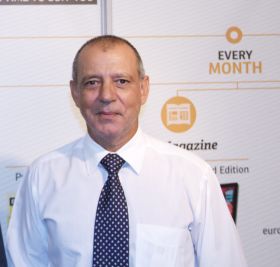
Allfresch, UK-based fruit supplier, is expanding into the Middle East markets with the opening of a new Dubai office.
The new facility will be headed up by Nick Evangelopoulos, former general manager of Yalda Trading. He previously spent seven years working for Chiquita as operations manager for the Middle East.
Allfresch is currently focusing on the development and expansion of its new brand, Amorita, which launched at the start of this year. It is featured on green bananas from Ecuador and Mexico, and limes from Mexico. The Shropshire-headquartered company’s primary markets remain the UK and Europe, but the opening of the Dubai office is part of its growth further afield.
Allfresch subsidiaries include Exotifruit, Frubanco, Fruesh, Allfresch Logistics and Summerseeds.
Currency rate changes pushed up cost of fruit but improved group’s sales revenue, while input costs also fell
Irish tropical fresh produce company Fyffes has reported strong trading figures for the first half of the financial year, including an operating profit of €31.2m.
The result was 38.2% higher than during the same time last year, mainly due to the fact that fines owed to the European Commission by Fyffes’ German import joint venture Inter Weichert – for breaching competition rules governing the supply of bananas in the EU during the period 2000-2002 – were less than in the year-earlier period.
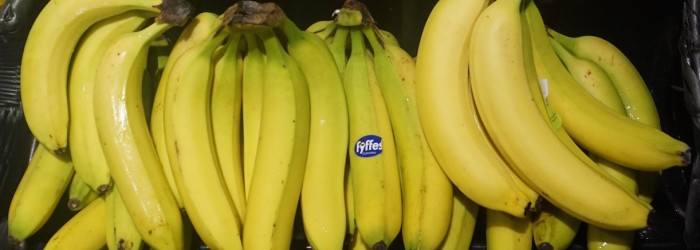
In addition, Fyffes managed to bring its savings back into the black, turning an €11.7m debt at the start of the year into a net cash reserve of €18.6m as of 30 June 2015.
“Fyffes is pleased to report a continuation of the strong growth in earnings achieved in recent years, with a 12.2% increase in adjusted [earnings per share] in the first half of the year,” commented group chairman David McCann.
The group also reconfirmed that it was targeting increased earnings (before interest and tax) for the year of between €44m and €50m. “This demonstrates the group’s ability to quickly adapt to prevailing market conditions given the significant adverse movement in exchange rates earlier in the year,” McCann added. “Fyffes continues to pursue increases in selling prices in all markets in this regard.”
Total revenue including joint ventures increased by 8.7 per cent in in the first half to €644.3m. Group revenue, meanwhile, which excludes Fyffes’ share of its joint ventures, amounted to €540.6m for the same period, up 10.3%.
Those increases were in part due to favourable changes in the value of the euro against both sterling and the US dollar when converting sales made in those currencies.
In addition, Fyffes delivered modest organic volume growth in the banana category, combined with some price increases in each product category. “Fyffes delivered a very satisfactory result in the banana category in the first half with operating profits €2m higher year on year,” the group said in its half-year report. “This was achieved notwithstanding the significant adverse change in exchange rates due to the strengthening late last year and early this year of the US dollar against sterling and particularly the euro.”
The fact that key the cost of running its banana business – including logistics, fuel and other import and operating costs in the UK – was cheaper in the first half of 2015 helped Fyffes significantly. Banana volumes, meanwhile, saw a modest increase in the period mainly thanks to rising demand from existing customers and price increases, it said.
Fyffes’ pineapple operations reportedly achieved a strong result in the first six months of the year with a €0.9m increase in profits, aided again by lower input costs and despite exchange rates exerting similar pressure. The group said its average selling prices were higher than in the first six months of 2014, in part due to a downturn in available volumes in the market.
Finally, its US melon business delivered a “satisfactory” result, with profits similar to what was described as a “very strong” result in the same period of 2014, “particularly given the prolonged period of poor winter weather experienced in the US earlier this year”. Weather issues in production regions apparently resulted in a slight fall in total volumes, contributing to an increase in production costs. “The group secured a modest level of price increases in response,” it stated.
Future success will depend on continued commitment to quality and innovation, say consortium directors
Italian apple group, Vog has marked the 70th anniversary of its foundation with a special press meeting and the launch of a new corporate logo.
Formed in Terlano, South Tyrol, amid the rubble of Europe just after the end of the Second World War, Vog has grown to become Europe’s largest single producer of apples and a major player on the international topfruit market, supplying markets in a large number of countries, both in Europe and beyond.
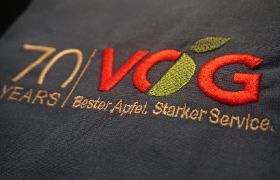
Vog president Georg Kössler described the anniversary as “a major milestone”. He also suggested that the group’s future success was assured provided it concentrated on product quality, joint marketing efforts and innovation across the board.
“Varietal innovation is the road we have to follow if we are to secure a good future for apple growing in South Tyrol,” he added.
His colleague Gerhard Dichgans, the consortium’s managing director, said the creation of a co-operative marketing system had played a major role in the development of agriculture in the South Tyrol region.
“In the future, I expect to see a continued change in the kind of apples being produced, with new varieties arriving and being sold through the new commercial structure we introduced a few years ago,” he commented.
“In terms of markets, Germany and Italy are no longer growing in terms of volume, so we have to chase new opportunities in other markets.”
The new logo features high-impact graphics and a simplified apple icon, which Vog’s PR manager Sabine Oberhollenzer said added a sense of modernity to the consortium’s traditional image while retaining the colour scheme and stylistic identity of the past.
The findings come from a study conducted among over 1,000 British children, aged six to ten years old
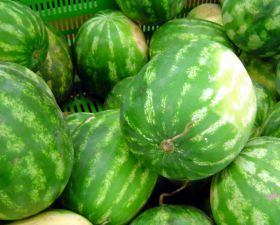
Six in ten of UK children have ‘no idea’ how the food they eat is grown, with one in ten (11%) reportedly not knowing that an apple grows on a tree.
The findings come from a study conducted among over 1,000 children, aged six to ten years old, and revealed confusion about the origins of strawberries, pineapples, grapes and watermelons.
The study follows a report by the BBC children’s news show, Newsround earlier this year which found that 52 in every 100 kids eats no veg, and 44 in every 100 children has no fruit on a daily basis.
The Fabulous Bakers conducted this latest piece of research to mark the launch of its new online film, which aims to educate and entertain children about how “fascinating and fabulous the natural world and its natural ingredients are.”
Percentage of UK children who don’t know how the fruit is grown:
Salvatore Genovese-grown hot chilli measures 1.4 million Scovilles and is available in Tesco stores until November
Tesco has launched what it claims is the “hottest-ever commercially-grown” chilli pepper into stores this week.
The Komodo Dragon chilli – which measures up to 1.4 million Scoville units – is grown for Tesco by the UK’s largest chilli grower, Salvatore Genovese, based in Blunham, Bedfordshire.
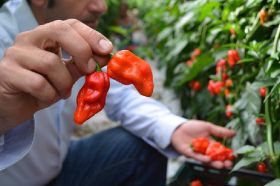
In comparison, a jalapeno pepper used in many pizza toppings measures 3,500 Scovilles, while the very hot Scotch Bonnet is rated up to 350,000 Scovilles, Tesco said.
Komodo Dragon chillis are now on sale in 500 stores in 15g packets sold for £1.
“In recent years we’ve had the fearsome Dorset Naga, the searing Bhut Jolokia and the mouth-numbing Trinidad Scorpion,” said Tesco chilli buyer, Eleanor Mansell. “But they all pale in comparison to the UK’s latest commercially-grown chilli pepper – the mighty Komodo Dragon which puts the others in the shade.”
Mansell said the Komodo Dragon is unusual because it has a delayed reaction that “lulls you into a sense of false security”.
“At first you can taste a wonderful hot fruitiness but then after about 10 seconds the full might of this little demon hits you and your whole mouth is aglow,” she said. “This is definitely a chilli pepper for connoisseurs and for those who are experienced in eating really, superhot food.”
Grower Genovese, who started growing chilli peppers about 15 years ago (after he took over his parents’ cucumber business), said hot chillis are the one that create the most interest. “So each year I try and grow one hotter than the last. I have chilli heads, as they’re known, contacting me from all over the world asking for samples,” he said.
“The Komodo Dragon should be livening up meal times over the coming months. I’d seriously advise anyone not experienced in eating really hot chilli peppers to have some milk or yoghurt ready as a standby to douse the flames.”
Genovese grows about one million chillis, or 15 tonnes, each week, on his seven-acre farm. Komodo Dragon chilli peppers will be available in Tesco until November.
Sally Sneddon, who has been at Morrisons as a buyer since 2005, replaces one-time banana buyer Mark Booth in the role.

Morrisons has appointed Sally Sneddon as its new top-fruit buyer.
Sneddon, who has been at Morrisons as a buyer since 2005, replaces Mark Booth – who was also the retailer’s stonefruit and banana buyer from 2008 to 2012 – in the position.
Sneddon began in her new role earlier this month. The change forms part of a wider reorganisation of Morrisons’ buying department.
The news comes amid a scandal engulfing the troubled big four retailer, whereby buyers at Morrisons have reportedly attempted to secure one-off payments from about 20 suppliers in a potential breach of the Groceries Supply Code of Practice, with only “a handful” blocked by the supermarket’s legal team.
An internal email from Morrisons’ legal team, allegedly seen by The Guardian, also tells buyers to get advice on how to continue to demand one-off payments from suppliers but satisfy regulators.
A spokesperson for Morrisons said: “We do have agreements with some of our suppliers that enable us to occasionally ask for support to enable us to invest in our business to the mutual benefit of Morrisons and our suppliers.”